Interview: Quest of a Gaza cyclist
Filmmakers document the trials and tribulations of a people under siege.
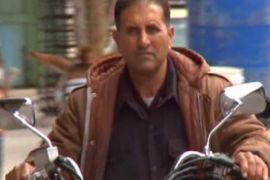
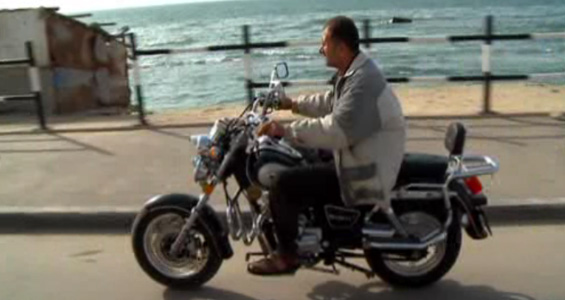 |
|
Munzer Dayya has been fixing motorcycles to earn an income for his children’s medical treatment |
George Azar, a Lebanese-American documentary filmmaker, and his wife Mariam Shahin, comprise the award-winning director/producer team which has produced over 26 films for Al Jazeera English since 2006, from 12 countries, spanning the Middle East, Africa, Europe, Mexico, the US and Central Asia.
In 2007, Gaza Fixer was short listed for the Rory Peck award for features.
Azar and Shahin also field produced, Two Schools in Nablus which won the UK’s Royal Television Society Education award in 2008, as well as the Japan Prize Education award.
Their latest film Locked in Gaza offers an insight into the daily struggles of a man trying to make a living and to find medical treatment for his family in the unique difficulties imposed on the Gaza Strip.
Munzer Dayya’s children are either visually impaired or physically handicapped.
His eldest daughter is blind and clings to the hope of travelling to London for specialist treatment; his eldest son is suffering from muscular disorder.
Besieged in Gaza, neither child has the hope of medical treatment abroad.
This film offers an insight into an everyday man struggling to make a living and to find a solution for his family in the unique difficulties of the Gaza Strip.
Al Jazeera spoke to Azar and Shahin about their latest film and how the current siege in Gaza continues to trap ordinary people.
Al Jazeera: What inspired you to make this film?
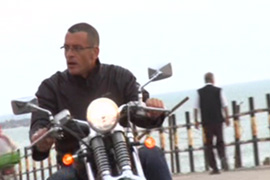 |
| Gaza has witnessed an increase of motorcyclists since the siege |
We had an idea about making a film that touched on physical freedom under lock-up in Gaza and about the things people do to find those transcendent moments of freedom.
Some people fly pigeons or go to the sea and listen to the waves and look out to the horizon.
One reason motorbikes are so popular is that they give you that rush of flying for a little while. Those moments can keep you sane.
And then the idea kind of evolved.
We have always been impressed by the sheer number of small mechanic shops in Gaza.
It is not a disposable society. If your appliance breaks down you do not throw it out and get a new one. You have got to fix it.
How did you discover Munzer and his family?
In our search for a really good mechanic to follow, people kept pointing us to Munzer, who they always added, is an amazing guy.
Munzer goes every where on his motorbike. But what struck us most about him was that he was always ‘sunny’, the sort of person that makes you feel better just by being around.
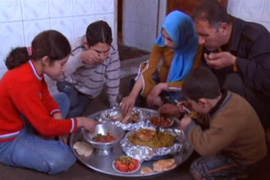 |
| Munzer is struggling to get his children out of Gaza to seek medical treatment |
So when we found out about the devastating burdens he carries personally, it made his story all the more compelling for us.
His spirit seemed to embody a larger attitude that you see often in Gaza.
Then when we went to Munzer’s shop; we were surprised by how impeccably clean and orderly the place was.
For example, Munzer takes the heavy cardboard boxes food rations are packaged in, cuts them up, and uses them as a kind of clean wallpaper to line the walls of his shop.
It is that kind of place. Every thing there is put away where it should be, and as he and his father worked, the parts are cleaned, and put down exactly in a row. There is an order and exactitude that is appealing in the chaos of Gaza.
So we used to go and hang around the shop, watching life go by, while people having problems with their scooters brought them in to get fixed. You could see the whole world go by on that street.
Did you face any obstacles while filming this piece?
Technically, the biggest problem was capturing the feeling of riding the motorcycle.
In other places it would have been easier, but it was made harder by the roads in Gaza.
The roads are rutted and potholed.
Just holding on to the camera and keeping it still and level, over rutted streets, with the wind, and sea salt, and sand was tough.
What was the hardest thing for you during this story?
Whenever you are profiling a person, the hardest thing is doing justice to the depth and complexity of their lives, as well as their lighter moments.
How do people in Gaza view the outside world?
The saddest part is that ordinary Gazans tend to think that the outside world is more aware and interested in their situation than we fear is the case.
Most Gazans do not know how little the people in rest of the world know about what is happening to them.
How did you feel about leaving this family behind after you finished filming?
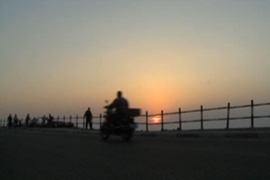 |
| Many people feel trapped in Gaza, but they also feel that there is hope beyond the horizon |
We do not feel we have left them. We are in touch with them regularly; we have just gone away for a little while until we return to Gaza.
Since the making of the film Munzer Dayya finally succeeded leaving to Saudi Arabia, via Rafah.
He managed to to get out with his son Muhammad, in an attempt to seek treatment for his condition.
Muhammad has undergone a series of tests and trial treatments.
Doctors are still assessing whether these will help improve his condition – the process is on going but Munzer remains positive.
Locked in Gaza can be seen from Monday, October 19, 2009 at the following times GMT 1230; Tuesday 0600, 1930; Wednesday 0830; Thursday 0330; Friday 1630; Saturday 2330; and Sunday 1030.